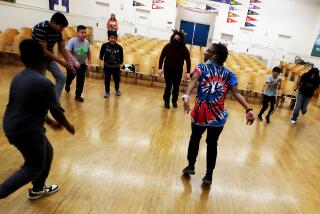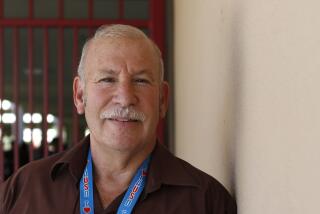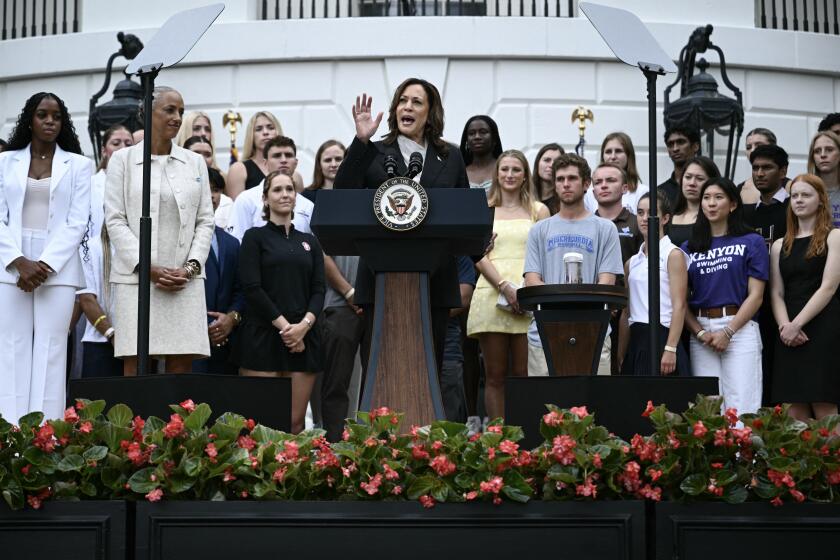Editorial: L.A. Unified rethinks its online make-up courses
A beaming Michelle King, superintendent of the Los Angeles Unified School District, announced last week that the district expected to post its highest graduation rate ever — 75% for the class of 2016.
Raising graduation rates is, rightly, a top priority for the beleaguered district, and the fact that King managed to do it in a year when new, more difficult academic requirements had gone into effect seems, at first blush, especially impressive. What’s more, as recently as December, the district had said that only half of its students were on track to graduate.
But as a Times editorial showed in June, the turnaround may not be not quite as remarkable as it appears. King deserves credit for undertaking a full-bore, multi-pronged approach to helping students who have flunked courses needed for graduation. To do so, however, she and the district appear to have cut some corners, relying heavily on insufficiently rigorous online “credit recovery courses” which at least some failing students were allowed to pass without actually doing the assignments or even taking much of the course.
In response, the University of California is now reevaluating whether L.A. Unified’s online credit recovery courses are truly worth the credits. And L.A. Unified says it’s going to tighten some of its rules about what is required of students taking the courses.
However, both of these steps fall short of what’s needed.
As The Times explained in June, students who flunk a high-school course can still receive credit in traditional ways — summer school or after-school classes, for instance — but they also have the option of taking online credit recovery courses in computer-equipped rooms at school or anywhere they have access to the Internet. After some academics and others suggested these courses might be insufficiently rigorous, a Times editorial writer took one of the courses offered at L.A. Unified — junior-year English literature — which included teacher lectures by video, readings, practice problems and tests that are graded by the computer program (although teachers are supposed to grade any significant writing assignments). Students are allowed to move at their own pace, so they might be able to finish making up a failed year-long course in a much shorter period of time.
UC should be setting clear and rigorous rules governing how much time and effort students must put into make-up courses in order to earn credit.
The coursework is rigorous enough. But the courses were set up so that students could skip virtually all of it if they passed a “pre-test” first — 10 multiple-choice questions, with access to the Internet for assistance. To pass that pre-test, L.A. Unified required students to get only six questions right — a 60% grade. What’s more, the test is fairly easy, and the two students interviewed by The Times who had taken that course said they had managed to skip most of the units by taking the pre-tests. Edgenuity, the company that developed the course, said most of the 1,900 districts that buy its courses don’t allow students to pre-test out of any part of the English courses; those that do generally require students to get a grade better than 60% and don’t let them skip writing assignments.
L.A. Unified said last week that in the future it would require a pre-test score of 70%, not 60%, before students could skip a course unit. And students won’t be allowed to skip units that include writing assignments. That’s a step forward, but not much of one.
Meanwhile, the University of California plans to look into the Edgenuity courses. UC is responsible for checking whether online credit recovery courses are rigorous enough to be accepted by UC and California State University for admissions purposes. In June, Monica Lin, associate director of undergraduate admissions, said UC would reconsider whether the courses should be approved if students were allowed to skip hefty portions through pre-testing.
A UC spokesman said this month that officials there would take another look at the Edgenuity courses to see whether the settings are really allowing students to get credit for the courses without actually taking substantial parts of them. But that’s only one company’s courses, as delivered by one school district.
Instead, UC should be setting clear and rigorous rules governing how much time and effort students must put into make-up courses in order to earn credit. And so should the state Board of Education. Without that, local districts — not just L.A. Unified, but those across the state — have every reason to artificially pump up graduation rates now that a new federal education law requires them to reduce the numbers of dropouts.
One agency, though, is setting rigorous standards: the NCAA. According to a spokesman for the college athletic organization, officials there became aware of the problems with credit recovery courses in 2008, when they saw high school athletes who planned to become NCAA athletes in college making up for courses they had flunked during the year with online classes that were taking them only a few days, or a few hours, to complete — and earning As.
In 2010, the NCAA put a new policy into effect: Any online course taken for credit recovery must be comparable in “length, content and rigor” to a regular course taught in a classroom. And students must have regular interaction with a teacher during the course. According to Nick Sproull, director of the NCAA’s Eligibility Center, it’s very rare for an online credit recovery course to be approved.
L.A. Unified officials say they require their students who plan to be college athletes to meet the NCAA rules, under which they must take the full credit recovery course with no pre-testing.
Why aren’t L.A. Unified, UC and the state similarly setting some real standards — not necessarily requiring the whole class, but at least something that represents what most people would think of as “taking a course” — for all students? Why don’t students attending college solely for the academics deserve to get a similar high school education as the student athletes?
It’s good news that L.A. Unified and UC are responding to the concerns raised about credit recovery courses. But it will only mean something if the schools raise their graduation rates without lowering their standards.
Follow the Opinion section on Twitter @latimesopinion and Facebook
More to Read
A cure for the common opinion
Get thought-provoking perspectives with our weekly newsletter.
You may occasionally receive promotional content from the Los Angeles Times.






